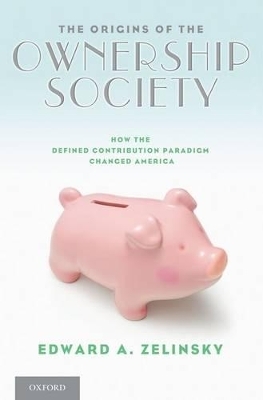
The Origins of the Ownership Society
How the Defined Contribution Paradigm Changed America
Seiten
2012
Oxford University Press Inc (Verlag)
978-0-19-991408-1 (ISBN)
Oxford University Press Inc (Verlag)
978-0-19-991408-1 (ISBN)
The Origins of the Ownership Society provides accessible discussion of issues central to the future of the Baby Boom generation and the country: retirement, educational savings, and medical expenses.
As Baby Boomers plan for their retirements, finance their children's educations, and provide for their families' medical expenses, they confront a fundamental reality: America today is a defined contribution society. We save for retirement, health care and educational savings through IRAs, 401(k) accounts, 529 programs, FSAs, HRAs, HSAs and other individual accounts which did not exist a generation ago. In its own way, the emergence of these accounts has been a revolution which has, step-by-step, without fanfare, cumulatively transformed tax and social policy in fundamental ways. The Origins of the Ownership Society describes the defined contribution revolution, its causes, and implications. For lawyers, the book provides useful insights into the network of individual accounts which are now central features of the U.S. income tax for retirement, medical, and health savings. For those concerned about public policy, the book provides useful guidance regarding our options in providing for the retirement of the mass numbers of Baby Boomers, and in preparing young Americans for the medical costs of their older years. The defined contribution format will, for good or for ill, be the framework governing the Baby Boomers' choices. For everyone else, including the Baby Boomers themselves, the book explains where we are, how and why we got there, and what our options are for the future.
As Baby Boomers plan for their retirements, finance their children's educations, and provide for their families' medical expenses, they confront a fundamental reality: America today is a defined contribution society. We save for retirement, health care and educational savings through IRAs, 401(k) accounts, 529 programs, FSAs, HRAs, HSAs and other individual accounts which did not exist a generation ago. In its own way, the emergence of these accounts has been a revolution which has, step-by-step, without fanfare, cumulatively transformed tax and social policy in fundamental ways. The Origins of the Ownership Society describes the defined contribution revolution, its causes, and implications. For lawyers, the book provides useful insights into the network of individual accounts which are now central features of the U.S. income tax for retirement, medical, and health savings. For those concerned about public policy, the book provides useful guidance regarding our options in providing for the retirement of the mass numbers of Baby Boomers, and in preparing young Americans for the medical costs of their older years. The defined contribution format will, for good or for ill, be the framework governing the Baby Boomers' choices. For everyone else, including the Baby Boomers themselves, the book explains where we are, how and why we got there, and what our options are for the future.
Edward A. Zelinsky is The Morris and Annie Trachman Professor of Law, Benjamin N. Cardozo School of Law, Yeshiva University
n/a
| Erscheint lt. Verlag | 28.6.2012 |
|---|---|
| Verlagsort | New York |
| Sprache | englisch |
| Maße | 231 x 155 mm |
| Gewicht | 277 g |
| Themenwelt | Geschichte ► Allgemeine Geschichte ► Zeitgeschichte |
| Geisteswissenschaften ► Geschichte ► Regional- / Ländergeschichte | |
| Recht / Steuern ► EU / Internationales Recht | |
| Recht / Steuern ► Wirtschaftsrecht ► Bank- und Kapitalmarktrecht | |
| ISBN-10 | 0-19-991408-7 / 0199914087 |
| ISBN-13 | 978-0-19-991408-1 / 9780199914081 |
| Zustand | Neuware |
| Haben Sie eine Frage zum Produkt? |
Mehr entdecken
aus dem Bereich
aus dem Bereich
Gewalt, Umwelt, Identität, Methode
Buch | Softcover (2024)
Spector Books OHG (Verlag)
36,00 €
wie Freud im Kollektiv verschwand
Buch | Hardcover (2024)
Klett-Cotta (Verlag)
25,00 €


